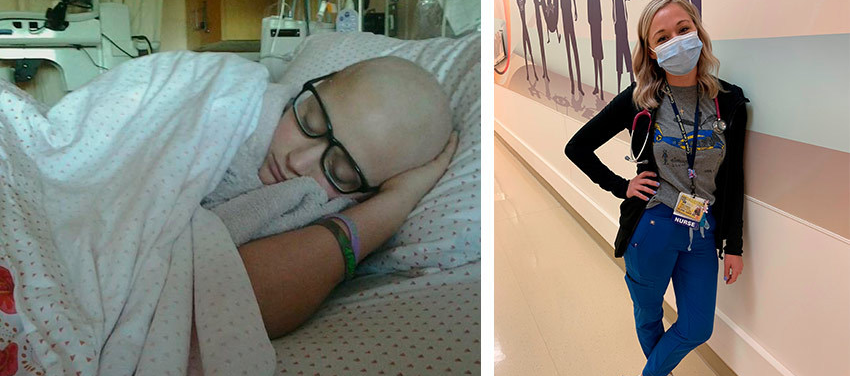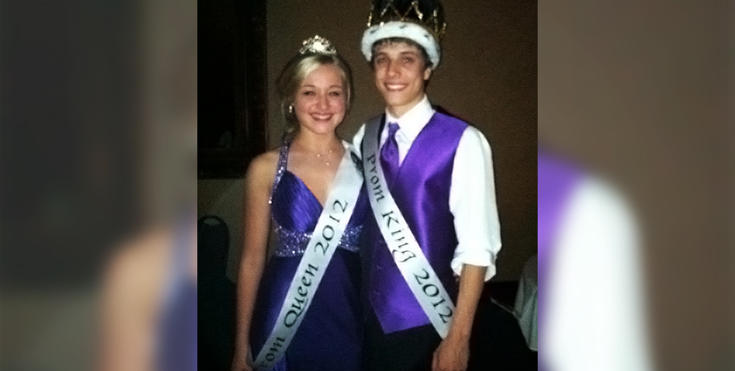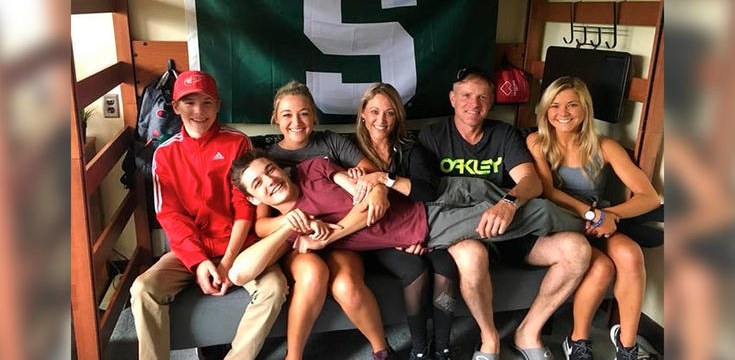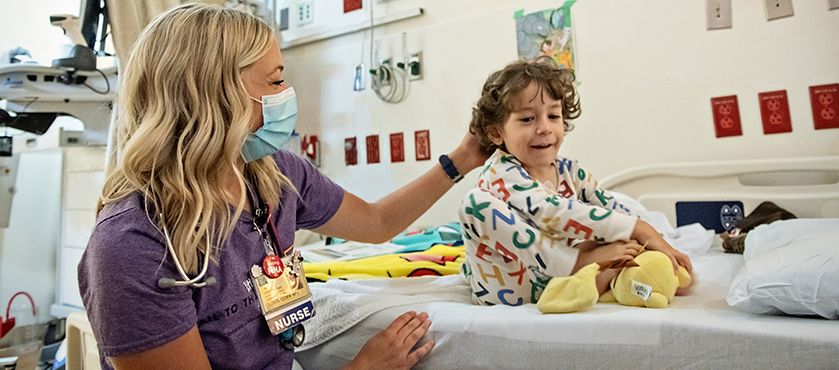After Surviving Hodgkin Lymphoma Twice, Olivia Goff Nurses Others
contributed by Mary Clare Fischer
Paying it Forward: Olivia Goff was diagnosed with cancer twice before age 21. But she kept her goals in sight, eventually becoming a nurse on the same floor she received treatment.

Photo courtesy of Goff.
On May 11, 2012, a pediatrician pulled Olivia Goff’s mother into an exam room and told her to take her daughter to the emergency room.
A few weeks earlier, the 17-year-old Goff had woken up with a lump on her neck. An ultrasound had revealed abnormal findings, but additional tests were needed to determine what was wrong.
May 11 was the day the results came back, revealing that Goff had Hodgkin lymphoma, a type of cancer that begins in the immune system.
“I didn’t know what that was,” Goff says. “I didn’t know it was cancer.”
The mass under Goff’s collarbone was so large that the pediatrician was concerned about its potential to cause breathing problems. That’s how Goff found herself in Michigan Medicine’s main emergency room, afraid that a tumor would keep her not only from enjoying adolescent milestones like prom, but also from fulfilling her adult goal of becoming a nurse.
It would take aggressive chemotherapy and a stem cell transplant to get rid of what would end up being two bouts of cancer.
Nine years later, not only is Goff cancer-free, she also works as an oncology nurse at the University of Michigan C.S. Mott Children’s Hospital — on the same floor where she received cancer treatment as a patient.
“I always said, ‘When I’m a nurse on 7 East at Mott,’” Goff says, “’then I’ve made it.’”
A persevering teen
It wasn’t as bad as they thought.
The biopsy results showed that Goff’s tumor wasn’t compromising her airway. The cancer was stage II, meaning it had been found in at least two of her lymph nodes, but hadn’t spread to the rest of her body.
In fact, Goff was still able to go to her senior prom a week later. She’d been worried that the scar from her biopsy would be visible in pictures from the dance, but her surgeon had promised he’d “make it look nice,” she recalls.
In photos from that night, any incision is far outshone by Goff’s bright smile and the shimmering crown on her head; she and her boyfriend, Connor, had been voted prom queen and king.

Photo courtesy of Goff.
Ray Hutchinson, M.D., Goff’s oncologist at the time, also told Goff she could wait an extra week to start her four rounds of chemotherapy, so she could go on a long-awaited cruise to the Bahamas with Hawley.
And Goff was determined that cancer wouldn’t stop her from doing the things she loved once she started treatment, either.
A week after her first round of chemo, for instance, she performed a solo and 13 group dances in her dance studio’s annual recital. In between numbers, she inhaled water, Tylenol, and Motrin backstage as Hawley peeled the costumes off her skin that was dripping with cancer- and chemo-induced sweat.
“I honestly don’t know how she did it,” Hawley says.
But her can-do attitude and support from her family got her through. By October, her perseverance had paid off: She was in remission.
Bringing out the big guns
Then, almost two years later, Goff began experiencing terrible back pain — but only when she drank alcohol.
Initially, they thought it might be kidney stones. Instead, the cancer was back.
“That second diagnosis was a lot more devastating for me,” Goff says, “because I knew what was to come.”
This time, there were multiple tumors: in Goff’s lymph nodes again as well as in her lungs and, most peculiarly, on her spine.
“Her relapse was fairly odd,” Hutchinson says. “Bone involvement occurs with Hodgkin’s disease, but it’s uncommon. And it would be really uncommon if the patient didn’t have it initially.”
Because of the rare elements of Goff’s cancer and its various locations, Hutchinson and the rest of Goff’s care team decided to give her a more aggressive chemo regimen and then a stem cell transplant that used her own cells to replace her bone marrow.
“To be able to cure her of her disease, we had to hit her with the big guns, so to speak,” Hutchinson says.
Goff stayed in the hospital for extended periods — a week at a time for chemo, a month for her stem cell transplant.
She celebrated her 21st birthday on the seventh floor at Mott, listening to the nursing staff sing “happy birthday” as they gave her a t-shirt they all signed. She wore a plastic crown that read, “21st birthday.”
But she didn’t have the same energy she’d had the last time she wore a crown.
The side effects of the treatment made it difficult for her to concentrate, so she took time off from college, where she planned to study nursing.
“She was angry at the cancer,” Hawley says. “She was angry at life. And she had every right to be.”
“There were periods where she just wasn’t sure how it would turn out, if she could keep going, if she was strong enough,” says Jana Thomas, one of Goff’s nurses. “For someone who’s so sweet and tender and cares about everybody else so much, it was really hard for her to focus on herself and be in the moment of being treated and healing instead of being out doing like all the other college kids.”
But then, Goff would look out the window of her hospital room into the hallway. Frequently, she saw small children “walking around and smiling and playing, with their little bald heads,” as she says.
Goff asked Hawley to buy the kids headbands and even a fedora for one little boy who was always running around. And she kept going.
“The kids just live,” Thomas says. “They don’t worry about tomorrow. That was a huge inspiration and something she drew strength from.”
“If they could do it,” Goff says, “then I could do it.”
Sharing Hope

Photo courtesy of Goff.
And she did do it.
May 11, 2021, marks nine years since Goff’s first diagnosis of cancer, but she’s spent more than five years cancer-free.
“She never lost sight of the fact that she could get over cancer,” Hutchinson said. “It was a privilege and an honor to see how she did.”
Ironically, Goff spent most of those cancer-free years at Mott — but not for treatment.
Goff’s husband, Connor (yes, the same boyfriend she took to prom), has cystic fibrosis, and spending time with him while he was hospitalized at Mott had endeared her to the nursing field before she was ever told she had lymphoma. Her own experience at the children’s hospital triggered an interest in pediatric oncology. She wanted to work with the same kids who had gotten her through her cancer journey, to support them in more ways than just buying them hats.
After networking her way into a position as a patient care technician in the cardiology department at Mott during college, Goff spent a year messaging the nurses who’d taken care of her on Facebook, asking about possible job openings on the pediatric cancer floor. The manager eventually asked Goff to come in for an interview, and she was offered the role on the spot.
“I remember that day so vividly,” Goff says. “It felt surreal to know that I was going to be working on the floor I was treated on.”

Photo credit: Leisa Thompson
“When I see her on the floor, it fills me with joy that someone who’s gone through what she has gone through is there now giving,” says Rama Jasty-Rao, M.B.B.S., who took over Goff’s care after Hutchinson retired. “It makes her a very special person because she has experienced what these kids have experienced.”
Goff says that something as seemingly minor as knowing that getting your port flushed can provoke nausea helps her help her patients (she provides mints or Jolly Ranchers for patients to suck on during the process.)
She doesn’t tell all her patients that she had cancer but sometimes mentions it if the conversation flows in that direction.
“I hope that when I do say it, it gives these parents and families hope that there is an end,” she says, “that there’s a light at the end of the tunnel.”
Download/print the Fall, 2021 issue of Thrive or continue reading the online version.
